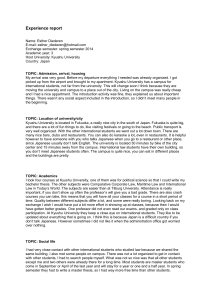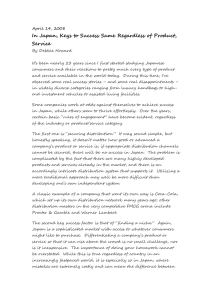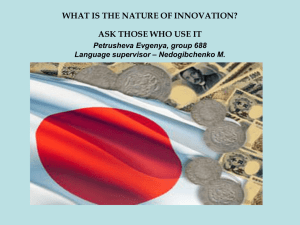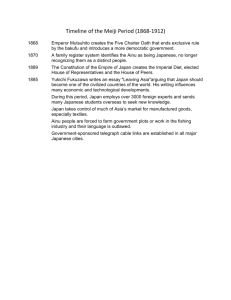Experience Report Name: Anh Huy Nguyen Exchange semester: Spring 2015
advertisement
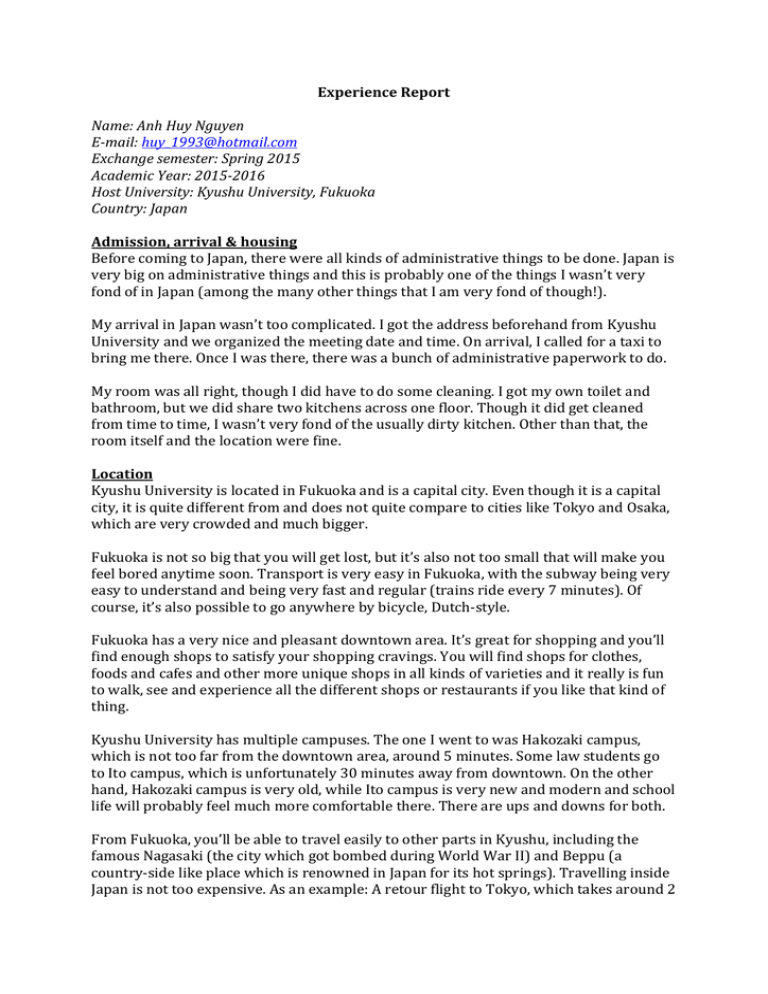
Experience Report Name: Anh Huy Nguyen E-mail: huy_1993@hotmail.com Exchange semester: Spring 2015 Academic Year: 2015-2016 Host University: Kyushu University, Fukuoka Country: Japan Admission, arrival & housing Before coming to Japan, there were all kinds of administrative things to be done. Japan is very big on administrative things and this is probably one of the things I wasn’t very fond of in Japan (among the many other things that I am very fond of though!). My arrival in Japan wasn’t too complicated. I got the address beforehand from Kyushu University and we organized the meeting date and time. On arrival, I called for a taxi to bring me there. Once I was there, there was a bunch of administrative paperwork to do. My room was all right, though I did have to do some cleaning. I got my own toilet and bathroom, but we did share two kitchens across one floor. Though it did get cleaned from time to time, I wasn’t very fond of the usually dirty kitchen. Other than that, the room itself and the location were fine. Location Kyushu University is located in Fukuoka and is a capital city. Even though it is a capital city, it is quite different from and does not quite compare to cities like Tokyo and Osaka, which are very crowded and much bigger. Fukuoka is not so big that you will get lost, but it’s also not too small that will make you feel bored anytime soon. Transport is very easy in Fukuoka, with the subway being very easy to understand and being very fast and regular (trains ride every 7 minutes). Of course, it’s also possible to go anywhere by bicycle, Dutch-style. Fukuoka has a very nice and pleasant downtown area. It’s great for shopping and you’ll find enough shops to satisfy your shopping cravings. You will find shops for clothes, foods and cafes and other more unique shops in all kinds of varieties and it really is fun to walk, see and experience all the different shops or restaurants if you like that kind of thing. Kyushu University has multiple campuses. The one I went to was Hakozaki campus, which is not too far from the downtown area, around 5 minutes. Some law students go to Ito campus, which is unfortunately 30 minutes away from downtown. On the other hand, Hakozaki campus is very old, while Ito campus is very new and modern and school life will probably feel much more comfortable there. There are ups and downs for both. From Fukuoka, you’ll be able to travel easily to other parts in Kyushu, including the famous Nagasaki (the city which got bombed during World War II) and Beppu (a country-side like place which is renowned in Japan for its hot springs). Travelling inside Japan is not too expensive. As an example: A retour flight to Tokyo, which takes around 2 hours by plane, is about 70 – 100 euro. You can also go by train or busses, which might sometimes be cheaper. Fukuoka is also closer than other Japanese cities to Korea, China, Vietnam and other Asian countries. I feel that it is a good location for travelling! Academics I took 4 law courses and 1 Japanese language course. My law courses are: - Bio-ethics and the Law: This course was given by a professor from England, whom was very good at explaining things in a way that makes it easy to understand. Personally, I think it’s a very interesting course, challenging you to think about deeper moral complexities involving the law. - Maritime law: I personally found this course the least interesting. Very simply explained, it is about law involving sea, ships and shipments. It involves combinations of international, private contract and public law. If this is appealing to you, this course might be for you. - Creative Economy and Cultural Diversity: This was a very unique course, which did not feel like a law course. It is basically about how culture and economy are related and focuses on creative companies that are culturally unique. I feel this is a very good course for exchange students to take, as you’ll learn a lot about other cultures and about how other people can think about certain cultures. - Law, Innovation and Economic Growth: This course is actually given by professor Erik Vermeulen from Tilburg University. His teaching style makes the classes very unique, interesting and engaging. It focuses on start-up companies and you basically have to play the role of a business lawyer who gives his client advice. This was probably my favorite course, as everyone in class was very into it and very actively participating, which sets for a much more enjoyable atmosphere in class. Surprisingly, the Japanese Language Course (JLC) was the most demanding. Instead of one class per week like the law courses, the JLC was three times per week, with more homework to boot and a lot of attendance requirements. Personally I found them to be very fun though, especially if you really are interested in learning Japanese. People are very active in class and are having fun with studying and practicing the language, despite the amount of homework. I think it’s a nice way of making new friends as well. I do have to warn to not take the JLC lightly, as learning a new language is always hard. Social life As it is with any student going abroad, the beginning might be a bit tough, as you will basically start a new life and are forced to make new connections with new people in a new and probably unfamiliar place. Unfortunately, school does not plan too many activities for you to connect easier with other people. However, I feel that as long as you are open to new people and new experiences, you won’t have problems making friends and finding the right people that are suitable with you. In the first place, an open attitude really is one of the most important things for when you will go on exchange and many international students will understand your position. As you’ll find people you can hang out with, you will find that there are lots of things to do when it comes to social life activities! I will list them to make it more organized: - If you like drinking, then you will like the so-called ‘nomikai’ that they have in Japan, which are basically all-you-can-drinks. They are often organized - - - downtown and some students like to go pretty regularly. Personally I’m not much of a drinker, but there were plenty of other options, such as: If you like eating, Japan is such an awesome place to be! Eating out is so much cheaper than in Holland (average is probably between 4 and 8 euro) and there is a big variety of dishes, which are all very different from each other. They have the famous sushi, all kinds of different noodle dishes, meat cutlets, Japanese barbecue, traditional Japanese rice dishes and more. They also have a lot of sweet shops and cafes for things such as pancakes, ice cream and tea and coffee. Shopping is great! There are so many stores for clothes and accessories, with so many different styles and prices. You will definitely find something that you will like and just looking around all the different stores is already so enjoyable. It does feel different from shopping in the Netherlands. For more active activities, there is karaoke, game centers and bowling! Karaoke is very Asian and is very interesting to experience and very fun if you enjoy singing. Game centers are very Japanese and also make for a unique experience. Universities in Japan have something called clubs or circles. These are organized by students who meet up weekly and do their activities together. You have all kinds of clubs/circles, ranging from sport clubs (which can be any sports really, like basketball, water polo and kendo) and music clubs to hiking clubs. They are easy to enter and I feel this is a great way to make friends as well. These are the things that I have been able to do in Japan. I have been able to try out all kinds of new things with all kinds of new people and it really was so fun and interesting. As long as you are open and are willing to search a little for these activities, you will be sure to have an enjoyable social life in Japan. Living costs Most of my living costs were covered by DUO and some of my savings. Your total living costs depends a lot on the housing that you will be assigned to. There are dorms which are 100 euro per month and dorms which are 300 euro per month. I feel that for this matter it is up to luck and fate to decide for you. On a flipside, you did not have to pay for books and all course materials are handed to you by the professor either physically or digitally. As for other things, I don’t feel daily life is necessarily much more expensive than in the Netherlands. A small overview of my monthly costs: - Room rent: € 300 - Food (including restaurants and dinner parties): € 200 - Public transport € 50 € 550 Keep in mind that this overview only covers my regular daily living costs and doesn’t factor in costs like shopping and travelling. These costs were very dependent on time and place. Also a note on public transport: the costs depend a lot on how much you use your bike (I personally didn’t use it a lot when I went downtown). Culture Japanese culture is very different from the Dutch one. Whereas the Dutch are known to be very direct, Japanese people are a lot more indirect, which sets for another atmosphere, which is not necessarily either good or bad. In the Netherlands, people are more inclined to voice their own honest opinion, which makes it easier to see what people really think and how they really feel. But this also creates more confrontations and discussions. Japan, on the other hand, dislikes conflict and is very peaceful and it’s much more rare to see these kinds of confrontations, though it might sometimes be difficult to tell what someone is really feeling. Of course, this should not be taken as standard window to view every single new person. Everyone is different, which applies to people of all countries. I have met many very honest and direct Japanese people while I also know many indirect Dutch people. But it is something to keep in mind and think about concerning the general atmosphere and mood in Japan. Japanese people are generally very warm and nice, especially in Fukuoka. They like being helpful and you can find yourself surprised at the amount of kindness and helpfulness sometimes. On a flipside, they might sometimes be afraid about their own English level, as the general English level is not very high here, which makes sense if you know about the differences in language and culture. As a result, you sometimes get the feeling they might be too shy to help you. Japan has a food culture! As eating out is much cheaper, it’s much more common to eat out than in the Netherlands, where going out for dinner or lunch feels like something more meant for special occasions. It is fun to search and try out all kinds of restaurants and Japanese people generally love eating as well. Personal development What is basically starting a new life in a new place with new people has taught me a lot. I have received a lot of new experiences and the confidence and riches that I get from those experiences is so much more valuable than I will be able to put in words. The number one most important thing that I have learned during this exchange is really that an open attitude is really important. As long as you are open towards new people, new experiences and new places, you will be able to go far. Meeting and getting to know new people, learning different ways of thinking and living, experiencing new situations and learning how to handle them in my own way helped me to develop myself and got me so much more further and every time again I realize the importance and impact an open attitude can have on one’s experience. Meeting so many new people every time again has also made it easier for me to simply approach new people and try to get to know them, as you are kind of pressured to do that any way if you are going on an exchange. I am very thankful I was able to receive this confidence. The many different people you meet also allows you to see how other people might think differently and as a result, my way of thinking has been able to broaden as well. Tips As I have explained multiple times before, an open attitude is probably what I would say is the most important thing to have when going on an exchange. As for other things, learning some Japanese before coming to Japan helps a lot. Japanese people generally don’t speak English too well and they appreciate it a lot if you show them that you try to communicate with them in their own language. For other practical tips: - Japan has many 100-yen stores. They basically have a lot of useful things for very cheap, especially when you just arrived. If you have the chance, check it out as soon as you can. - It’s very warm and humid. Prepare accordingly, especially for summer. - You can easily withdraw money from convenience stores (so called 7-11’s) from your own Dutch bank account. Feel free to ask or mail me anything about an exchange to Japan or Japan in general! Lastly, I think Japan is a great place for an exchange program. If you like new places and want to try living in a totally different environment with a very different mood and different people, I recommend you to try for Japan!

